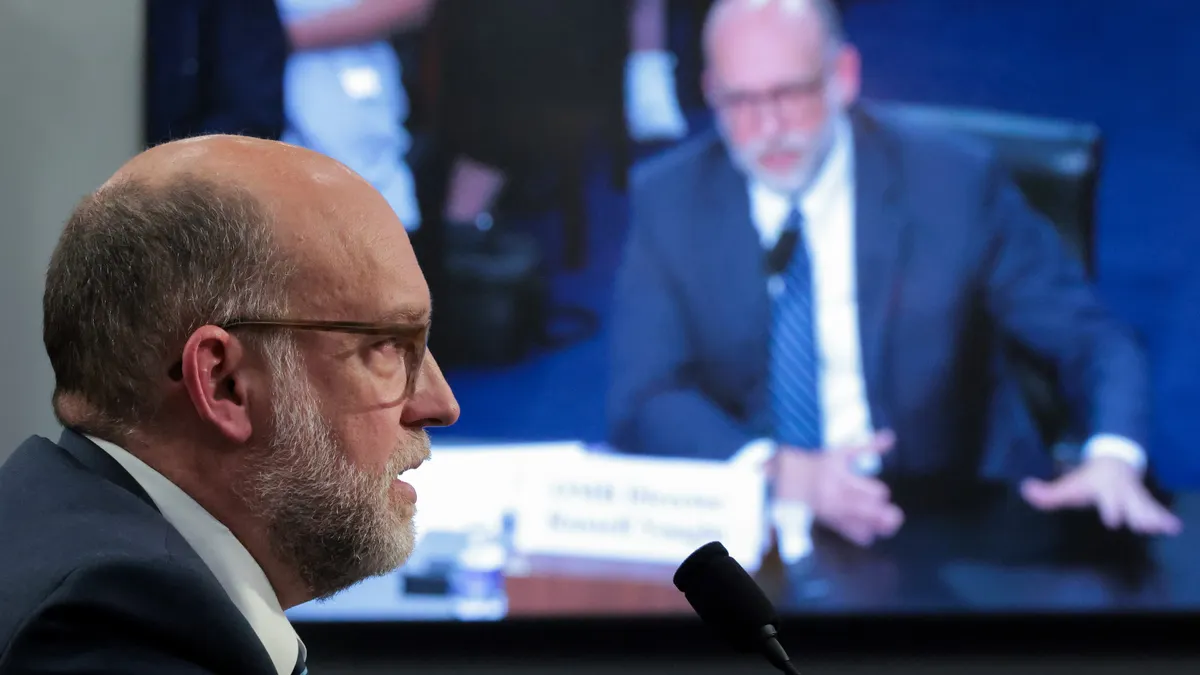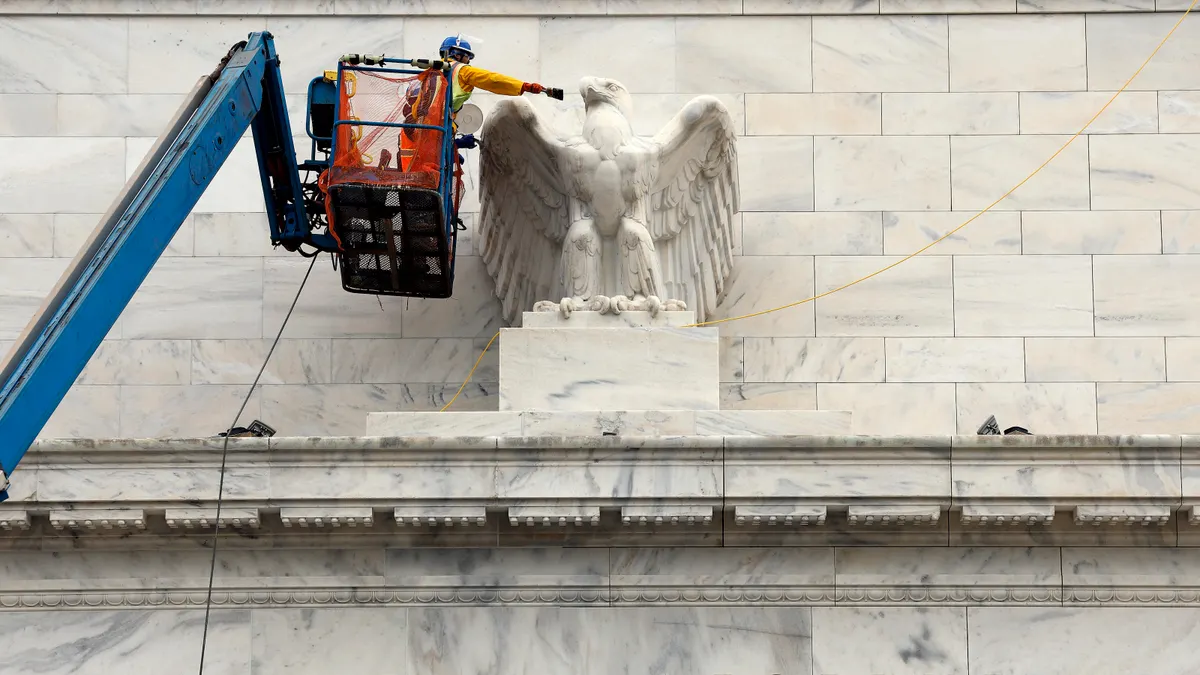In the 1987 all-time box-office bomb “Over the Top,” Sylvester Stallone plays a trucker and estranged dad-with-a-heart-of-gold who moonlights as a competitive armwrestler. At one point in the film, he talks to a reporter about how he compartmentalizes to go into armwrestling mode. (He turns his cap backward.)
Yikes, let’s make this reference from the Baby Boomer golden era a little more contemporary. In “Gossip Girl,” Dan Humphrey’s dad-with-a-heart-of-gold plays in a band, Lincoln Hawk, named after Stallone’s armwrestling trucker.
The point: This week, Russ Vought may have turned into Lincoln Hawk (the armwrestler, not the band).
Vought, the Trump administration's acting Consumer Financial Protection Bureau chief who began his tenure by telling Federal Reserve Chair Jerome Powell that the bureau wouldn't take any further unappropriated funds from the central bank, is now putting the screws to Powell in his cap-backward full-time role as director of the White House's Office of Management and Budget.
Vought, in a Thursday post on X, accused Powell of “grossly mismanag[ing] the Fed” and blasted the central bank for going over budget on a still-unfinished 2021 plan to renovate two office spaces in Washington, D.C.
The project, once billed at $1.9 billion, has ballooned to $2.5 billion – a figure Vought compared Thursday to construction of France’s Versailles palace (adjusted for inflation).
The Fed has attributed the overrun to “significant increases in raw materials costs, … higher labor costs and changes in construction schedule expectations.”
Vought wouldn’t be the first public servant to take Powell to task on the renovation, but his comments Thursday mark an escalation of rhetoric around it.
Six Republican senators wrote Powell last month, asking the Fed chair to justify the renovation, which they said included rooftop garden terraces, ornate water features and white marble – choices the lawmakers called “lavish.”
In testimony June 25 before the Senate Banking Committee, Powell dismissed the lawmakers’ concerns.
“There’s no VIP dining room, there’s no new marble,” Powell said. “There are no special elevators — there’s just, there are old elevators that have been there — there are no new water features, there’s no beehives and there’s no roof terrace gardens.”
But the story has persisted. President Donald Trump, during a Cabinet meeting Tuesday, said Powell “should resign immediately” if he misled lawmakers as to the extent of renovations.
Vought on Thursday sent a letter to Powell, asserting that the Fed chief’s testimony “raises serious concerns about the project’s compliance with the National Capital Planning Act.”
“Although minor deviations from approved plans may be inevitable, your testimony appears to reveal that the project is out of compliance with regard to major design elements,” Vought wrote. “This would … require the Fed to immediately halt construction and obtain a new approval from the [National Capital Planning Commission] before proceeding any further.”
In his testimony, Powell doubled down. “Inflammatory things that the media carried are … not in the current plan,” he said.
To that end, Vought urged Powell – within seven business days – to verify several facets of the 2021 renovation, and how they line up with current plans.
Numbers as weapons
Vought’s primary role in the Trump administration is a budgetary one, so it stands to reason that he would analyze through a lens of cost effectiveness.
His inner accounting nerd came out in Thursday’s letter and X post. The Fed renovation “will result in an average of 512 square feet of space per employee, which is well above the OMB average recommendation of 150,” he wrote in the letter.
“The cost [of the Fed renovation] per square foot is $1,923 – double the cost for renovating an ordinary historic federal building,” Vought wrote on X.
But Vought also has a history of wielding budgets as weapons. In 2023 comments to the Center for Renewing America, he pushed an effort to cripple the Environmental Protection Agency so it “can’t do all of the rules against our energy industry because they have no bandwidth financially to do so.”
“We want their funding to be shut down,” he said. “We want to put them in trauma.”
Taking away money is Vought’s go-to move. Before issuing a much-maligned stop-work order at the CFPB, he wrote Powell saying the agency would refuse unappropriated funds from the Fed starting in April.
Separate entities sued Vought over the funding move and the stop-work order. The city of Baltimore in May dropped its lawsuit after CFPB leadership found there was no mechanism to transfer money the Federal Reserve had given the agency. A district judge, meanwhile, ordered an injunction against the stop-work order.
But Vought moved to Plan C. If the money can’t be taken away and the work can’t be frozen, the CFPB could simply reorganize, the thinking may have been. Then, the agency could justify cutting 90% of its workforce. Or not.
Out on a technicality?
Like Vought, Trump appears to embrace a “by-any-means-necessary” stance.
His disdain for Powell is well-documented – enough so that two days after Trump’s reelection, a reporter asked Powell whether he would resign if the then-incoming president were to ask. (He said no.)
After Trump fired two Democratic board members at the National Credit Union Administration, observers questioned whether the president would try the same with Powell. Trump later assured that he has “no intention” of dismissing Powell. (Not to be underplayed, the Supreme Court also exempted the Fed from a ruling upholding Trump’s firing of officials from the National Labor Relations Board.)
But the president has persistently pressured Powell through social posts to drop interest rates. Powell’s resistance has led one of his international contemporaries, European Central Bank President Christine Lagarde, to hold him up as the “standard of a courageous central banker.”
Trump, too, has shown his Plan C (arguably, D). If Powell won’t resign, be fired or succumb to browbeating, maybe the administration can force him out on a technicality, the thinking may be.
Alongside Trump’s Tuesday comment that Powell “should resign immediately” if he misled lawmakers on the Fed renovation, he mused: “We should get somebody in there that’s going to lower interest rates.”
Vought’s letter should serve as a warning that the Fed renovation is the technicality meant to bring about “trauma.”






















